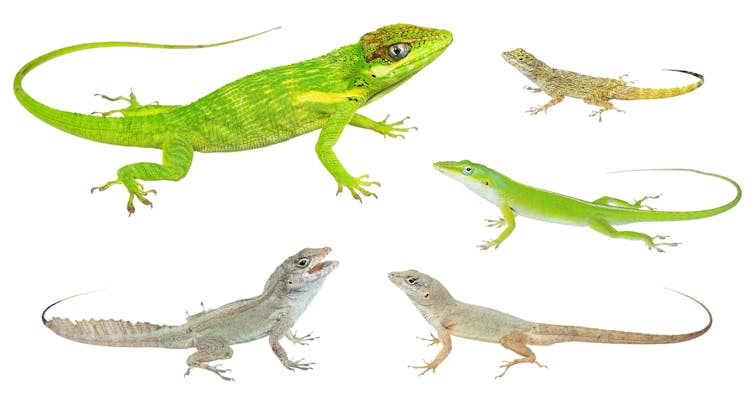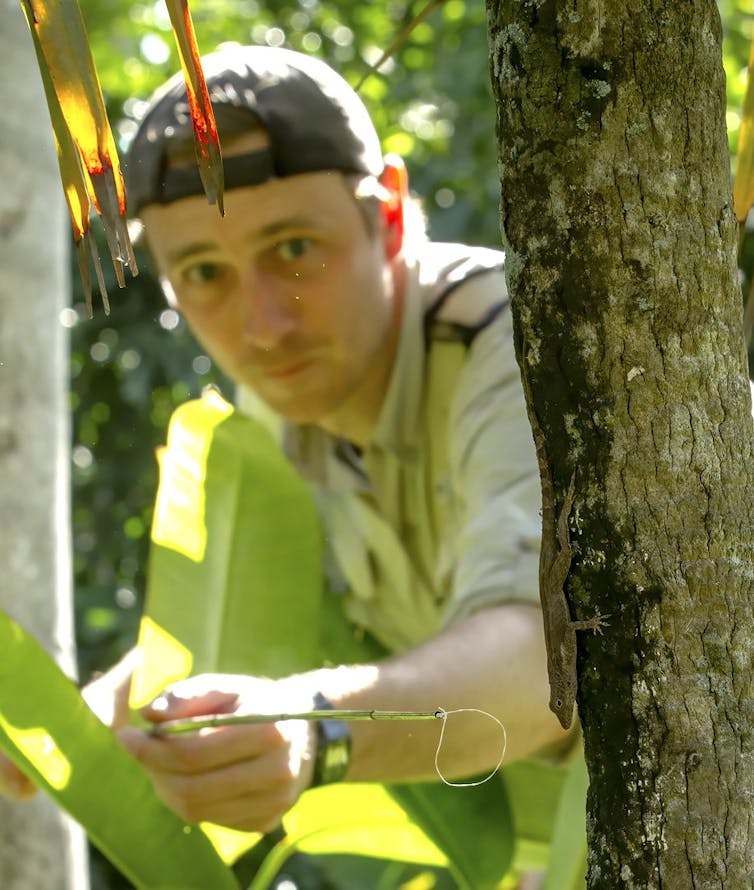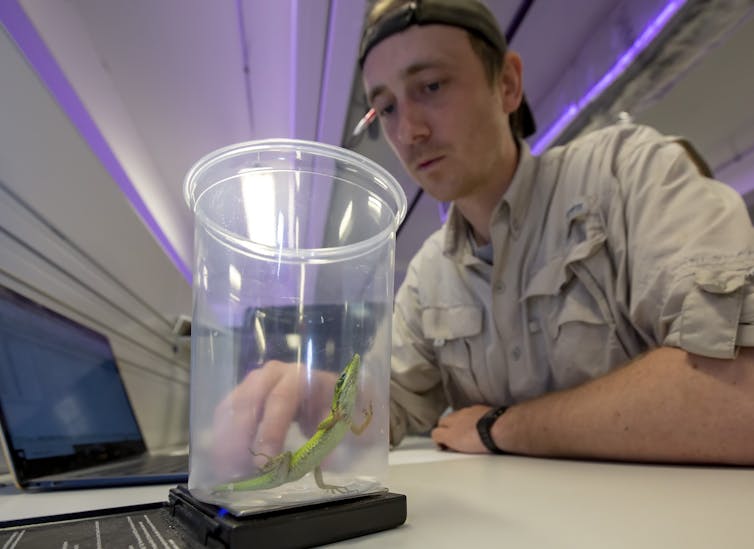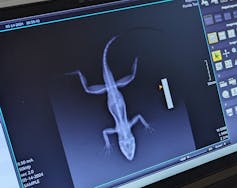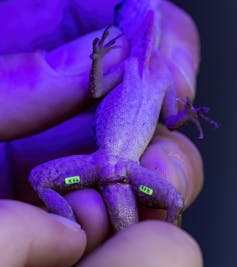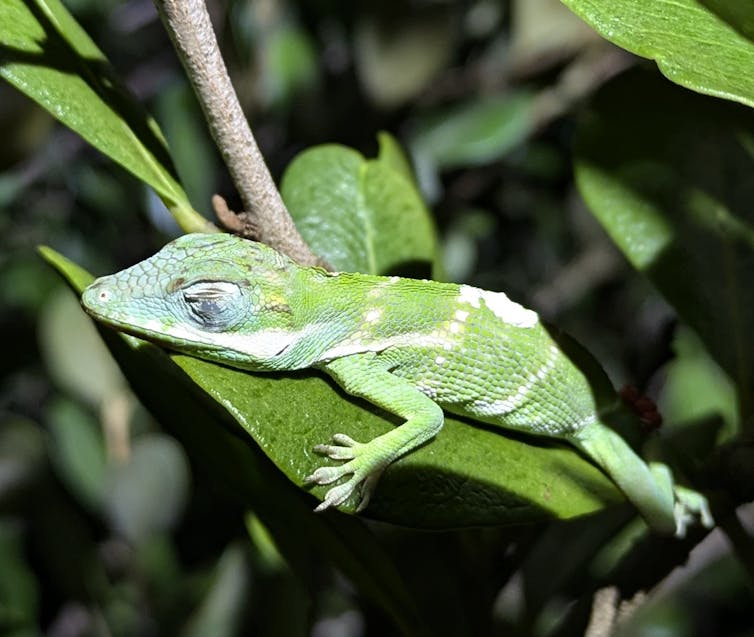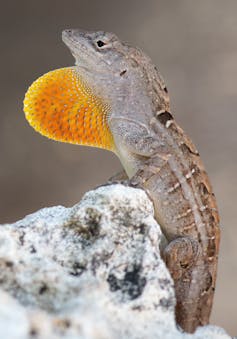Every morning in Miami, our fieldwork begins the same way. Fresh Cuban coffee and pastelitos – delicious Latin American pastries – fuel our team for another day of evolutionary detective work. Here we’re tracking evolution in real time, measuring natural selection as it happens in a community of Caribbean lizards.
As an assistant professor of ecology and evolution at Georgia Tech, my journey with these remarkable reptiles has taken me far from my London roots. The warm, humid air of Miami feels natural now, a far cry from the gray, drizzly and lizard-free streets of my British upbringing.
Our research takes place on a South Florida island roughly the size of an American football field – assuming we’re successful in sidestepping the American crocodiles that bask in the surrounding lake. We call it Lizard Island, and it’s a special place.
Here, since 2015, we’ve been conducting evolutionary research on five species of remarkable lizards called anoles. By studying the anoles, our team is working to understand one of biology’s most fundamental questions: How does natural selection drive evolution in real time?
Each May, coinciding with the start of the breeding season, we visit Lizard Island to capture, study and release all adult anoles – a population that fluctuates between 600 to 1,000. For the entire summer, female anoles lay a single egg every seven to 10 days. By October, a whole new generation has emerged.
The Secret Lives of Lizards
Anoles aren’t early risers, so we don’t expect much activity until the Sun strengthens around 9:30 a.m.; this gives us time to prepare our equipment. Our team catches anoles with telescopic fishing poles fitted with little lassos, which we use to gently pluck the lizards off branches and tree trunks. Ask any lizard biologist about their preferred lasso material and you’ll spark the age-old debate: fishing line or dental floss? For what it’s worth, we recently converted – we’re now on Team Fishing Line.
Picture yourself as an anole on Lizard Island. Your life is short – typically just one year – and filled with daily challenges. You need to warm up in the Sun, find enough food to survive, search for a mate, guard your favorite branch from other lizards and avoid being eaten by a predator.
Like human beings, each lizard is unique. Some have longer legs, others stronger jaws, and all behave slightly differently. These differences could determine who survives and who doesn’t; who has the most babies and who doesn’t.
These outcomes drive evolution by natural selection, the process where organisms with traits better suited to their environment tend to survive and reproduce more. These advantageous traits are then passed on to future generations, gradually changing the species over time. However, scientists still have an incomplete understanding of exactly how each of these features predicts life’s winners and losers in the wild.
To understand how species evolve, researchers need to crack open this black box of evolution and investigate natural selection in wild populations. My colleagues and I are doing this by studying the anoles in exquisite detail. Last year was especially exciting: We ran what we called the Lizard Olympics.
Tiny Fishing Poles
As the morning heat builds, we spot our first lizards: Cuban brown anoles near to the ground, and the mottled scales of Hispaniolan bark anoles just above them. Further up, in the leafy tree canopies, are American green anoles, and the largest species, the Cuban knight anole, about the size of a newborn kitten.
In 2018, a new challenger entered the arena – the Puerto Rican crested anole, a species already present in Miami but one that hadn’t yet made it to Lizard Island. Its arrival provided us with an unexpected opportunity to study how species may evolve in real time in response to a new neighbor.
Catching these agile athletes requires patience and precision. With our modified fishing poles, we carefully loop the dental floss over their heads. Each capture site is marked with bright pink tape and a unique ID number; all lizards are then transported to our field laboratory just a short walk away.
The Lizard Olympics
Here, the real Olympic trials begin. Every athlete goes through a comprehensive evaluation. Our portable X-ray machine reveals their skeletal structure, and high-resolution scans capture the intricate details of their feet. This is particularly critical: Like their gecko cousins, anoles possess remarkable sticky toes that allow them to cling to smooth surfaces such as leaves and maybe even survive hurricanes.
We also measure the shape and sharpness of their claws, as both features are crucial for these tree climbers. DNA samples provide a genetic fingerprint for each individual, allowing us to map family relationships across the island and see which is the most reproductively successful.
The performance trials are where things get interesting. Imagine a tiny track meet for lizards. Using high-speed video cameras, we precisely test how fast each lizard runs, and using specialist equipment we measure how hard it bites and how strong it grips rough branches and smooth leaves.
These aren’t arbitrary measurements – each represents a potential evolutionary advantage. Fast lizards might better escape predators. Strong bites might determine winners in territorial disputes. Excellent grip is crucial for tree canopy acrobatics.
Each measurement helps us answer fundamental questions about evolution: Do faster lizards live longer? Do stronger biters produce more offspring? These are the essential metrics of evolution by natural selection.
As afternoon approaches, the team relocates each piece of bright pink tape and returns the corresponding lizard to the exact branch it was caught on. The anoles now sport two tiny 3-millimeter tags with a unique code that lets us identify it when we recapture it in future research trips, along with a small dot of white nail polish so we know not to catch it immediately after we let it go.
At 8:30 p.m., with the Lizard Olympics done for the day, we return to the island donning headlamps. Night brings a different perspective. Some of the most wily lizards are difficult to catch when fully charged by the midday Sun, so our nocturnal jaunts allow us to find them while they sleep. However, it’s often a race against time. Hungry lizard-eating corn snakes are also out hunting, trying to find the anoles before we do. As we wrap up another 16-hour day around 11:30 p.m., the team shares stories of the night.
Evolution on the Island
Now spanning 10 years, 10 generations and five species, our Lizard Island dataset represents one of the longest-running active studies of its kind in evolutionary biology. By tracking which individuals survive and reproduce, and linking their success to specific physical traits and performance abilities, we’re documenting natural selection with unprecedented detail.
So far we have uncovered two fascinating patterns. Initially, it didn’t pay to be different on Lizard Island. Anoles with very average shapes and sizes lived longer compared with those that are slightly different. But when the crested anoles arrived, everything changed: Suddenly, brown anoles with longer legs had a survival advantage.
The Lizard Olympics is helping us understand why. The larger, more aggressive crested anoles are forcing brown anoles to spend more time on the ground, where those with longer legs might run faster to escape predators – allowing them to better survive and pass on their long-leg genes, while shorter-legged anoles might be eaten before they can reproduce.
By watching natural selection unfold in response to environmental changes, rather than inferring it from fossil records, we’re providing cutting-edge evidence for evolutionary processes that Charles Darwin could only theorize about.
These long days of observation are slowly revealing one of biology’s most fundamental processes. Every lizard we catch, every measurement we take adds another piece to our understanding of how species adapt and evolve in an ever-changing world.![]()
This article is republished from The Conversation under a Creative Commons license. Read the original article.

